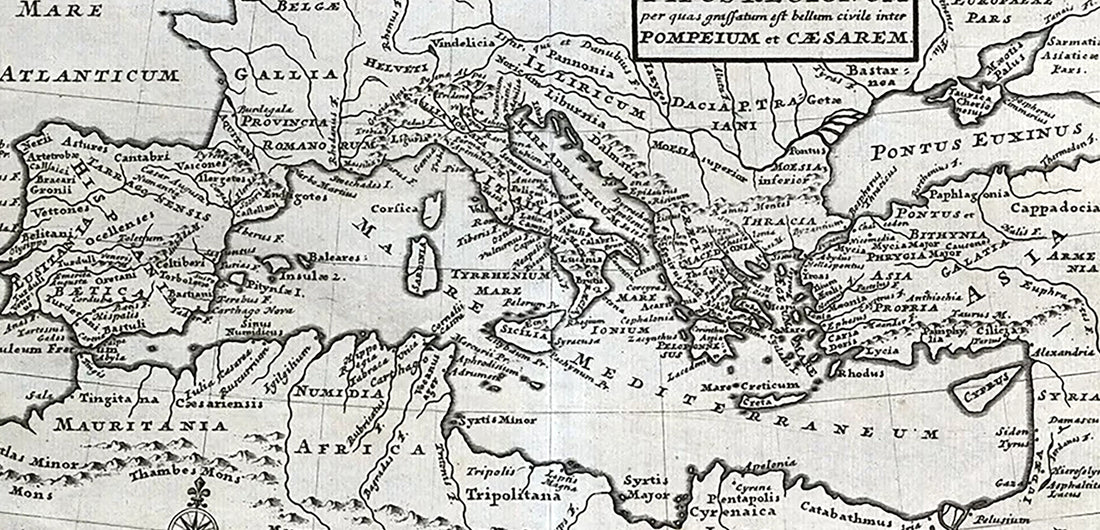
The civil war between Caesar and Pompey
Alice PettirossoShare
The epic struggle for the dominion of Rome
The civil war between Julius Caesar and Pompey the Great (49-45 BC) was one of the most dramatic pages in Roman history, a conflict that brought the Republic to the brink of collapse, paving the way for the Empire. This titanic clash was a struggle between two brilliant leaders and the culmination of social and political tensions that had consumed Rome for decades. As the two men faced each other in a life-and-death battle for power, the fate of the Republic was decided on the battlefield.
The context: the Republic at sunset
In the 1st century BC, the Roman Republic was a giant with feet of clay. Territorial conquests were expanding across three continents, but internally, social and political conflicts were slowly crumbling. The old institutions were no longer able to manage the new challenges: growing poverty, rampant corruption and tension between the aristocratic elites and the popular masses made the balance increasingly precarious. In this scenario, three men emerged as pillars of power: Julius Caesar , Pompey the Great and Marcus Licinius Crassus. In 60 BC, they formed a secret alliance, the First Triumvirate, in an attempt to control the unstable Roman political scene.
With the death of Crassus in 53 BC, the balance between Caesar and Pompey began to crack. Pompey , supported by the elites and the Senate, represented the traditional order, while Caesar , with his victories in Gaul, embodied change and the aspiration of the masses. The tension between the two became explosive, leading Rome to an inevitable clash.
The fatal step: the Rubicon
In 49 BC, the Senate, under the influence of Pompey , ordered Caesar to disband his army and return to Rome as a private citizen. But Caesar , who had conquered Gaul and the heartland of his legions, was unwilling to relinquish power. In a bold move, he crossed the Rubicon , the border separating his province from Italy, and in doing so declared war on the Senate and Pompey . "Alea iacta est" (the die is cast) , Caesar pronounced, marking the beginning of a civil war that would forever change the course of history. Pompey , surprised by Caesar 's determination, fled to Greece to reorganize his forces, while Caesar marched on Rome without encountering resistance.
The Battle of Farsalo: The Banquet of Defeat
In the heart of the summer of 48 BC, Greece became the theater of the decisive battle. Pompey , certain of victory, led a massive army, supported by the Senate and the Roman elite. In his camp, tension was nonexistent, replaced by arrogance and the security of a triumph taken for granted. While the stars shone above Pharsalus , in the Pompeian headquarters they discussed not military tactics, but how to divide the charges and spoils of victory. Some senators were already drawing up lists of enemies who would be exiled after the fall of Caesar , and Pompey , in his swagger, was preparing a banquet awaiting the glorious dawn.
What the Pompeians could not have imagined was that Julius Caesar was orchestrating a masterful trap, a carefully thought-out plan to turn the tide of battle despite their obvious numerical inferiority. His strategy, bold and brilliant, was based on an ace up his sleeve: a reserve cohort, cleverly hidden behind the cavalry, ready to unleash at the right moment. As the Pompeian horsemen launched a furious assault, Caesar ordered his light infantry to withstand the impact. And in the chaos created among the enemy ranks, still disorganized by the unexpected resistance, he ordered his hidden legion to emerge from the shadows and strike with deadly precision, overwhelming Pompey 's cavalry. With the horsemen fleeing and the enemy troops in panic, Caesar pushed his legions forward, striking hard and catching Pompey completely off guard, sowing terror and disorder among his ranks. Victory, now, was only a matter of time.
In a matter of moments, the euphoria in Pompey 's camp turned into chaos. The troops, disoriented and overwhelmed, began to give way. Pompey watched the defeat with disbelief, his dream of glory crumbling before his eyes. Defeated and humiliated, he fled to Egypt, where a tragic epilogue awaited him: he was brutally murdered at the hands of Ptolemy XIII, who hoped in this way to gain Caesar 's favor.
After Farsalo: The Consolidation of Caesar's Power
With the victory at Pharsalus , Caesar was now unstoppable. Having landed in Egypt, he not only found himself involved in local dynastic struggles, but he also began a legendary relationship with Queen Cleopatra, with whom he had a son, Caesarion. From here, Caesar continued his campaign of conquest, eliminating the last pockets of Pompeian resistance. The final twist came in 45 BC, at the Battle of Munda, in Spain, where Caesar finally defeated Pompey 's supporters.
The consequences: the end of the Republic and the birth of the Empire
Caesar 's victory marked the very death of the Republic. Having become dictator for life in 44 BC, Caesar began a series of revolutionary reforms. He reorganized the calendar, introduced the Julian calendar, and extended citizenship to new provincial populations. But his rule met a brutal fate: on March 15, 44 BC, he was assassinated by a group of conspirators, including his friend and protégé, Marcus Junius Brutus. Ironically, he was killed right under the statue of Pompey , closing a tragic circle.
The death of Caesar , far from restoring the Republic, unleashed a new wave of conflict, culminating in the rise of Octavian , the future Augustus , who transformed Rome from a republican city to an eternal empire.

